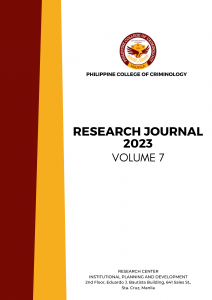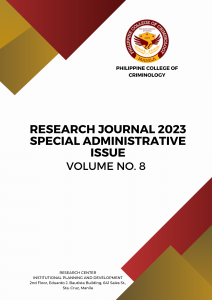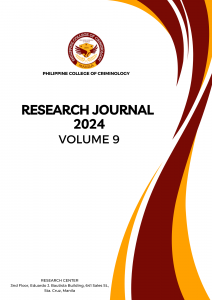The Research Center (RES)
Overview
The Research Center is at the core of research development in the PCCR. Thus its tasks revolve around the implementation of research policies and the coordination and management of research and publication activities within the institution.
The RES Vision
A globally recognized center of excellence and a leader in innovative programs in the generation, capture, analysis, enhancement, application, and diffusion of knowledge through research.
The RES Mission
To inspire and transform lives toward nation-building through fostering a total enabling environment for research.
The RES Strategic Goals
The Research Center shall pursue the following strategic goals:
- Lead the College in knowledge generation, capture, analysis, enhancement, application, and diffusion within the National Capital Region;
- Address current human and societal concerns through relevant research collaboration between the College and its stakeholders;
- Develop a research infrastructure in the College that fosters a culture of research;
- Empower the faculty, non-academic employees, and students in research through capacity-building activities;
- Demonstrate the research capacity of the PCCR through its participation in and or/hosting of national and international research conferences; and
- Establish the position of PCCR as a leading research college through the publication of an accredited journal of research.
The RES Intermediate Goals
The RES shall aim to achieve the following intermediate goals:
- Improve the research capability of faculty, non-academic employees, and students;
- Increase the research productivity of the institution, through the faculty members, staff, and students, in areas that can contribute to local and national development; and
- Generate knowledge or technologies needed for:
- Higher education development particularly in the field of criminology and criminal justice;
- Policy plan formulation, particularly for its various program offerings and the College as a whole; and
- Developing innovative programs that would place PCCR in the cutting-edge of Criminal Justice education and research in the country.
The RES Immediate Goals
The RES shall accomplish the following immediate goals:
- Improve the conditions for increased research production and thereby establish a solid foundation for the PCCR to be a research-driven institution;
- Enhance research quality and impact by fostering collaboration, providing resources and training, establishing robust review processes, and supporting early-career researchers;
- Develop the quality and quantity of research services rendered by the RES to the PCCR academic community; and
- Foster research collaborations between the PCCR and its partner agencies through cross-institutional research, promoting the exchange of knowledge and expertise, and
Facilitate joint research projects that address complex societal challenges.
- Research Journal 2021 (Volume 5)
- Research Journal 2022 (Volume 6)
- Research Journal 2023 (Volume 7)
- Research Journal 2023 (Volume 8)
- Research Journal 2024 (Volume 9)
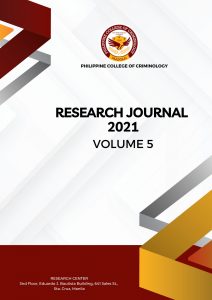 Toward Criminological Laboratory Innovations: Learning from the Student Online Experiences in Forensic Chemistry and Toxicology
Toward Criminological Laboratory Innovations: Learning from the Student Online Experiences in Forensic Chemistry and Toxicology
Arman R. Bibiolata, Jr., Novilla Cruz, Karl Lenin Olegario, and Jasper Jamil B. Dela Cruz
ABSTRACT
This study aimed to explore and interpret the experiences of third-year students of the Philippine College of Criminology (PCCR) in learning Forensic Science and Toxicology in a new learning setup. The method of investigation was a qualitative research approach involving eight students from the college. The main priority of this study was to understand their experiences as well as the evaluation of how they considered these experiences. This study revealed that the new Forensic Chemistry and Toxicology learning presented new challenges brought by changes in the teaching-learning setup. These changes left students with an absence of choices except to move forward. Even though students disagreed with the new normal, they saw a justification in the time and money spent for these as it gave them new experiences, self-growth, and development in exciting ways. Nevertheless, this research showed that students believe that a learning experience will be fully satisfied only by face-to-face learning setup or the blended type of learning where they can have practical application, especially in a hands-on course like Forensic Chemistry and Toxicology.
Keywords: COVID-19, criminological laboratory, forensic, online modality, students, toxicology
PCCR Students Perceptions on the Effectiveness of Hard Lockdowns as a Police Policy During the First Surge Of the Pandemic
Jowelyn Jade Q. Galima, James Patrick S. Suba, Rose Ann M. Batarlo, Keifth Lexer B. Magno
ABSTRACT
As a result of the rising number of COVID-19 instances in the first semester of 2020, some governments have placed their countries or particular areas of their countries under lockdown. Government-enforced lockdowns, however, have a variety of repercussions that can be observed. Lockdowns and other methods for containing outbreaks, like contact tracing, testing, and isolation. The specific goal of this study is to create theories that would explain the success of the strategies the Philippine National Police used during the first wave of the COVID-19 pandemic. The best laws and health precautions for halting the spread of the virus are determined by researchers while preserving calm and order in the area reserved for PCCr fourth-year students.
Keywords: COVID-19, Pandemic, Planning, Police, Outbreak, Health, Lockdowns, Students
The Effects of Online Learning on the Academic Performance of 4th Year Criminology students in Philippine College of Criminology
Joel B. Malabarbas, Keanu Manuel Aquino, Michael Madaje, and Rafael Collado
ABSTRACT
This study aimed to determine the relationship between online learning and academic performance of 4th-year criminology students. This research paper explained how the 4th year students cope with the changes in learning, and what’s the effect of online learning on the academic performance of college students. The Researcher used a sampling technique that included 203 students from a private school in the Philippine College of Criminology as participants. This study utilized a non-experimental quantitative research design, specifically, correlational technique, through the use of a validated questionnaire, mean, and Pearson r. With an overall computed r-value of -0.45 with a P-value greater than 0.05, that is p=0.577. The results accepted the hypothesis of no significant relationship between online learning and academic grades. This Study perceives the difficulties students face during online classes and how the Covid 19 affects online learning. Moreover, this research helps advisers or faculty determine the best approach to learning during online classes.
Keywords: Covid-19, Online learning, Academic performance, Criminology, Students, face-to-face, Philippines
Conditions of Traffic Congestion in Pasay City: An Exploratory Study
Jaenard Idia Gonzales, Paola O. Arce, Ivan Harvey M. Reduta, Sean Henry D. Flores, Christian D. Sablaon, Austin Keith G. Gloria, Kurt Russel P. Luistro, Archelou F. Inot, Jonathan O. Lacsa, Reynald C. Patosa, Joshua S. Mohamitano, and Mel Vince M. Gutierrez.
ABSTRACT
This study focused on evaluating the effectiveness of traffic enforcers in mitigating traffic congestion at the Edsa-Taft Crossroad in Pasay City. The study aimed to identify the key factors contributing to traffic congestion at the Edsa-Taft Crossroad, shedding light on potential improvements in traffic management efficiency and the reduction of congestion. This study showed some problems, including incomplete road construction, insufficient traffic facilities, poor enforcement of traffic laws, human error, and ineffective traffic enforcers, which greatly impacted traffic congestion. The respondents were adamant that proactive and visible traffic enforcement was essential for regulating vehicle flow and improving road comfort. It was advised to concentrate on ongoing education and strict training for traffic enforcers regarding traffic laws, regulations, and appropriate traffic direction and control to significantly reduce traffic congestion in Pasay City. Additionally, enforcing traffic laws and regulations strictly could aid in changing the attitudes and driving behaviors of other road users. The study emphasized the importance of training traffic police officers and enforcing strict compliance with traffic laws as the most important effective means to reduce traffic congestion in the area.
Keywords. Traffic Congestion, Efficiency of Traffic Enforcers, Traffic Laws, and Regulations, Road Users
Exploring Crime Victimization Among Taxi Drivers: A Qualitative Study
Ana Carmela E. Pakiding, Genericci Yvonne Q. De Lumpa, Kyl M. Carmen, Jayward M. Marasigan, John Paul Miguel M. Falcan, Rowsell I. Sarabia, Jeffrey Guballo, Mark Genesis L. Lazaro, Daniela May P. Lopez, Kian Royce A. Cempron, and Darwin L. Pore
ABSTRACT
This study explored the victimization experiences of taxi drivers on the road and their coping mechanisms. The authors identified the need to address the victimization of taxi drivers, a group frequently overlooked as crime victims. Using a qualitative research design, the researchers conducted in-depth interviews with ten taxi drivers in Metro Manila to gather their perspectives on victimization and coping strategies. The findings revealed that taxi drivers face various forms of road victimization, including physical assault, robbery, and verbal abuse. Furthermore, the study uncovered the coping mechanisms utilized by the drivers, such as seeking help from fellow drivers and relying on personal faith. Overall, the research highlighted the need for greater attention to the victimization experiences of taxi drivers and emphasized the importance of developing appropriate support systems for them.
Keywords: crime, taxi drivers, and victimization
Gender Equality: Policewomen’s Perspective
Alexis Prado, Jan Aireen Cueto, Jhona Borromeo, Jonalyn Cajes, Kisha Llendra Java, Lorrie Jane Loterte, Ma. Jhasmine Masangcay, and Patricia Rodriguez
ABSTRACT
This study investigated the impact of discrimination on Filipino policewomen, focusing on their workload, physical health, mental well-being, and coping strategies. The qualitative research involved in-depth interviews with policewomen serving for one to three years, aged at least 25, from various cooperative police stations in Manila. The study aimed to understand why they stay in the profession despite gender equality challenges. Findings revealed limited awareness of gender stereotypes, unequal task assignments, and societal perceptions of inferiority. To address these issues, the researchers recommend a tailored training program to improve physical and mental well-being, reducing workplace disadvantages for female officers.
Keywords: Gender equality, policewomen, discrimination, coping mechanism, gender role, stereotype
The Effect of Fake Online Booking in the Life of Food Delivery Riders in Manila
Cristina M. Viacrusis, Edmond P. Caguioa, Ivander J. Domingo, Rocky P. Agustin, Dominique Dan S. Pagsanjan, and Joshua V. Vicente
ABSTRACT
This study aims to investigate the impact of fake online bookings on the lives of delivery riders using a quantitative research approach. The study surveyed 60 delivery riders in Manila using a structured questionnaire to collect data on their experiences with fake online bookings. The results revealed that fake online bookings significantly affect delivery riders. All respondents reported experiencing fake online bookings, with 91% reporting financial losses. Additionally, 83% reported delays in their delivery schedule and potential earnings loss, while 93% experienced stress and anxiety due to fake bookings. The study also found that delivery riders who worked longer hours and used multiple delivery platforms experienced fake bookings more likely. The study recommends that delivery platforms take measures to prevent such incidents and support the affected riders and the government to implement regulations to protect the rights of delivery riders in the food delivery industry.
Keywords: customers, experiences, fake online bookings, food delivery riders
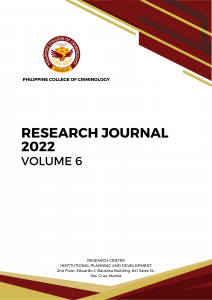
Adversities and Victimization Among Grown-Up Street Children in Quezon City: An Exploratory Study
Gaypelyn M. Casiw
College of Criminal Justice
ABSTRACT
This study examines the adversities faced by adult street dwellers who grew up on the streets in Quezon City, Philippines. Employing a narrative research design, the life stories of two participants, who were both victims and offenders, were collected. The Socio-Ecological Model of Resilience was used to understand how street children navigate adversities and victimization throughout their lives. The findings reveal the vulnerability and fragility of the lives of street-dwelling children and their families, trapped in a cycle of poverty with limited opportunities for escape. The narratives shed light on the structural injustice and government neglect experienced by the poorest of the poor in the Philippines. Despite these challenges, the participants show resilience through the support of significant adults, early involvement in child work to survive, and realizing the consequences of their delinquent actions. Through this research process, the participants found a voice, enabling them to move from a position of vulnerability to agency and empowerment. The study highlights the importance of giving marginalized populations a platform to express their experiences and concerns. By understanding the pathways leading to adaptive outcomes in the context of street adversities, society can shift towards a more agentic view of street-dwelling children. Future studies are recommended to include a more representative sample of street-dwelling adults in Quezon City and explore adversities processes among different socio-economic groups in the Philippines. A mixed-method approach could provide a comprehensive understanding of resilience among marginalized populations. These findings can inform interventions to address the unique needs and challenges faced by street-dwelling children, helping to create a more supportive and inclusive society.
Keywords: adversities, adult street dwellers, victims and offenders, Socio-Ecological Model of Resilience, vulnerability, fragility.
Molave Youth Home: A Study on the Experiences of Social Workers in Handling Child in Conflict with the Law
Sharina Jane Tantoco-Peralta, Erika C. Caores, Ma. Ronalyn S. Santos, May Angeline C. Nabong, Marjorie L. Baris, Iris Trescia May V. Menosa, Samil Rose R. Belonio, Henry T. Gamotin Jr., Janus Matthew Mora, John Maenard D. Destajo, and Antonio B. De Guzman Jr.
ABSTRACT
This study sought to investigate and analyze social workers’ experiences dealing with juvenile offenders. The researchers employed the qualitative research design to discuss the insights of this study with a focused group discussion study method to ascertain and explain participant experiences and the concepts they draw from those experiences. The researchers interviewed eight social workers from the Molave Youth Home, who agreed to participate in this study. This research study assessed social workers’ experiences in handling children in conflict with the law regarding their admission, rehabilitation, and post-care. It also unveils how social workers face and overcome the challenges of managing children in conflict with the law concerning their emotional, physical, and mental capabilities. Moreover, the researchers proposed programs to address the problems mentioned to improve social workers’ experience level.
Keywords: behavior, a child in conflict with the law, counseling, rehabilitation, reports, social workers
LGBTQIAP+ PDL Inside the Jail: Experiences, Challenges, and Policies
Joan Adrian C. Tabalanza, Rose Merylle C. Maglaque, Erica B. Hubajeb, Rizhelle-Lyn T. Tingson, Mercedita L. Lumbao, Alexandra Jane M. Solsona, Leah Veronica G. Gadaingan, Albien M. Mustrales, Carl Ian B. Genisera, and Jonald L. Hermogeno
ABSTRACT
This study aimed to investigate the experiences and difficulties faced by LGBT+ individuals who are persons deprived of liberty (PDLs) within the confines of a correctional facility. Specifically, the study examined their mental health struggles, the type of care they receive, the fairness of their treatment, and the policies that impact them. The research was carried out at Manila City Jail, with participants from the LGBT+ community selected through convenience sampling. Focus group discussions were employed as the primary data-gathering tool. Following a thematic analysis, this study revealed that the experiences and challenges encountered by LGBT+ PDLs were multifaceted. The support and care they currently receive were generally deemed satisfactory; nevertheless, certain areas were identified as requiring improvement. Based on the findings, this thesis puts forth recommendations for policy modifications and interventions aimed at addressing the difficulties faced by LGBT+ PDLs and enhancing their experiences while incarcerated. The study emphasizes the necessity of prioritizing the prompt resolution of cases involving LGBT+ PDLs to ensure the protection of their rights and prevent prolonged detention and potential abuse. Furthermore, raising awareness.
Keywords. LGBTQIAP+, PDL, sexual orientation, gender, SOGIE
Law Enforcement Social Media Influencer: Impacts to Youth
Leia Grace Elaine Unarce, Ric Jhay S. Allapitan, Sheila B. Delos Reyes, Benedicto A. Desaville, Imee P. Enrique, Matthew B. Fonacier, Lordlene Micah D. Lopez, Stephane A. Nagrampa, Jake Val F. Ondivilla, and Joshua M. Pulvera
ABSTRACT
In a world that is full of people using them, it is imperative to realize the full potential and maximize the capabilities of mobile devices. Social media has a huge impact on people’s daily lives and has become an essential part of everyone’s existence. The purpose of this research is to investigate and assess the impact of police officer influencers on delivering awareness and knowledge to the public through the use of various social media sites, communities, and forums. The proper implementation of the citizens’ awareness will enable them to respond and assess what actions should be taken into consideration upon the happening of a certain event or circumstances being communicated through several social media outlets. This will also serve as information for all national and local law enforcement divisions to properly disseminate information and implement potential improvements for the better and harmonious transmission of information as well as establishing efficient communication. The researchers collected information through quantitative research to gauge youth perceptions of police influencers delivering awareness through social media. The researchers studied law enforcement social media influencers and their impact on youth. The results showed that females were more quickly affected by police content than men. Facebook was the most frequently used influencing platform with most respondents using social media for 4-5 hours a day. The researchers recommend a program in every station in a barangay to give information, awareness, and security by using Facebook Live or a seminar for law enforcement. Social media influencers can use their platforms to promote positive messages about safety, respect for authority, and community engagement. They can also provide useful information about the law enforcement profession and help to build trust between the police officers and the communities they serve.
Keywords: gadgets, police officers, policing, social media, video, vlogger
Correctional Institution for Women: Motherhood Experiences
Maximino A. Dones, Erebeck D. Daub, Ronnie O. Alba, Mike Lander G. Alipante, John Ed Arca, Jemwell Jenan E. Bañados, Alexander P. Gordon, Mark Fernando P. Mabutas, Mach Ibn V. Macarunay, Jeffrey G. Notario, John Steven T. Polo, and Kenneth Tecson
ABSTRACT
This study aimed to explore the experiences of women-PDL (persons deprived of liberty) during their pregnancy and motherhood journey and identify the challenges and coping strategies they employed. Using a Biopsychosocial approach, data were collected from three (3) PDLs in the Correctional Institution for Women (CIW) through online interviews. This topic is under-researched, making it significant to shed light on incarcerated mothers’ unique challenges. The data analysis revealed several themes, including the challenges incarcerated mothers face, such as separation from family, helplessness, and lack of resources. However, the coping strategies employed by these mothers were inspiring, with many finding strength in surrender, breaking chains and building bonds, and the power of faith. The study also found that the CIW adhered to international standards, such as the Bangkok and Mandela rules, by providing comprehensive maternal healthcare services, including prenatal care, nutrition access, and a safe environment. The findings of this study have implications for policymakers, correctional institutions, and society as a whole, highlighting the unique challenges incarcerated mothers face and the need for support and resources to maintain their parental role and connection with their children.
Keywords: childbirth in prison, incarcerated women, maternal incarceration, motherhood experience, pregnancy and incarceration, pregnant persons deprived of liberty
Social Media as an Investigative Tool in Searching for Criminal Offenders
Lowell Fredrick A. Madrileño, Amor May A. Regino, Denro L. Roxas, Aldrich C. Agabao, Martt Guiller L. Jimenez, Gerald D.Nazarrea, Kian Egan S. Ciervo, Nicholai E. Montiel,
Joseph C. Mesinas, and Dominic P. Domingo
ABSTRACT
Social media has radicalized the way crimes are committed in our present day. As an offshoot of this, social media has evolved to become a potent tool for law enforcement officers to identify and detect criminals. The dominant explanation for this trend is that social media has already established itself as the most holistic and encompassing source of information about individuals and their interactions with other individuals and society as a whole. The magnitude of usage and the sheer volume of users in social media platforms combined with their ready accessibility highlights social media platforms as a treasure trove of information about individuals. The responses elicited from both Police Commissioned Officers and Police Non-Commissioned Officers from Quiapo, Manila was utilized to estimate the percentage of effectivity of the use of social media platforms in identifying three (3) key components in the criminal investigation process – suspect, witness, additional evidence and information. To augment the findings of previous research, data was also gathered as to problems present in the use of social media platforms as an investigative tool. Findings show that the use of social media platforms proves effective in identifying suspects, witnesses, and additional pieces of evidence and information. Nevertheless, a stark contrast is evident as to how social media platforms are used in gathering information. In terms of usage, police officers prefer to use social media as a searching tool rather than a crowdsourcing tool as shown by the mean scores obtained from the data gathered in this study In order to further strengthen the impact of this study, further research may include respondents from other law enforcement agencies in order to ascertain the extent of social media usage in their own organization.
Keywords: social media, Facebook, investigative tool, surveillance, social network, suspect, witnesses, additional evidence, information.
COVID-19: Impact On Persons Deprived Of The Liberty Inside The Correctional Institution For Women In Mandaluyong
Victor Jim P. Fallar, Joel Due, Kim Jason T. Escarillo, Mark O. Mobilla, Joana Marie A. Nuestro, Crystelle Faith T. Patriarca, Baby Jean E. Retardo, Samantha Nicole S. Santillana, Arianne Mae G. Santos, and Desiree F. Sto. Tomas
ABSTRACT
The study’s main purpose is to determine the impact of covid19 protocols implemented by the Inter-Agency Task Force (IATF) on Correctional Institutions for Women. Specifically, it sought to determine the level of the implementation of Covid19 health protocols in Correctional Institutions for Women in this research; the researchers used observation and interviews to collect the data using explanatory sequential mixed methods that use quantitative and qualitative information to answer a research question. In quantitative research, numerical data are analyzed. That can be used for statistical analysis, while qualitative research involves collecting data for experimental purposes or to find common themes. Based on the findings, the health protocols set by the IATF are highly implemented. The researchers asked for permission for the twenty Person Deprived of Liberty to be interviewed. Correctional Institution for Women may innovate the E-Dalaw through video calls is hereby recommended. In addition, the researchers also recommend using the traditional way of sending letters through the post office or tapping an accredited courier for those persons deprived of liberty who do not have cellphones that they can use to contact their families or if they want it to be more personalized. Moreover, additional telephones are to be used by the PDL. Lastly, the CIW should consider adding more effective extracurricular activities and entertainment like mind games to lessen their boredom and eliminate stress and anxiety.
Keywords: Covid-19, Inter-Agency Task Force, persons deprived of liberty, CPVID-19 protocol.
